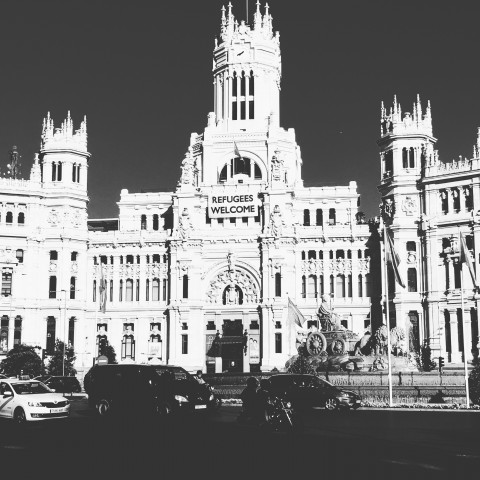On the second weekend in June, hundreds of people flocked to Barcelona to discuss the idea of municipalism and radical democracy, broadly under the banner of “Fearless Cities.” This event also served to commemorate two years of progressive leadership throughout many of Spain’s city halls, including Madrid and Barcelona. Activists, mayors, city council members, academics, and NGO workers came together to explore such themes as “feminizing politics,” “sanctuary and refuge,” and “anti-corruption and transparency.” Despite these weighty ideas, the event was joyous and at times jubilant. During an opening conversation that served to welcome participants, Manuela Carmena and Ada Colau, the mayors of Madrid and Barcelona, spoke of friendship and intimacy even during our dark geopolitical moment. Indeed, despite this light tone, Trump was often in evidence.
Since the beginning of their administrations, these citizens’ platforms in Spain have explicitly staked a left-leaning claim against the hard right turn of the government, particularly regarding immigrants and the question of Europe’s ongoing refugee crisis. Early on, both Madrid and Barcelona declared themselves to be cities of refuge; Madrid’s city hall has proudly worn a “Refugees Welcome” banner for the better part of two years. With Trump’s victory, presaged on this side of the Atlantic by the rise of Le Pen and Wilders, Poland’s renewed nationalism, the endless drama of Brexit, and the constant specter of Islamophobia in response to terrorism, those sentiments are important antidotes to a global turn towards fear and hate.
Spain, however, still seems far removed from Lesbos and Lampedusa, and has yet to receive an influx of refugees. At the same time, its population grows ever more diverse, and its major cities are now full of multi-ethnic neighborhoods. Wandering the Raval neighborhood in Barcelona on a Monday, I chanced upon a school getting out for lunch; the young students who streamed out were Filipino, Pakistani, and Chinese with nary a “native” face in sight. This is the newest generation of urban Spaniards. Yet despite the dramatic demographic shifts, neither “Fearless Cities” nor the broader project of Spanish municipalism has taken up the question of immigration and ethnic and racial difference as a serious component of contemporary urban governance. While Barcelona’s charismatic and charming deputy mayor (and friend of the UDL), Gerardo Pisarello, is a Latino immigrant, the ranks of Barcelona en Comu and Ahora Madrid are startlingly devoid of migrant voices. And despite having emerged in part from the multi-ethnic housing movement, these platforms often appear to treat migrants as objects of political action instead of incorporating them as fellow political subjects.
This reality was brought home during a session on initiating municipalism in the United States. As Kali Akuno of Cooperation Jackson described his organization’s efforts to reclaim an urban politics of redistribution, it was clear that historical legacies of enslavement continue to shape the present in a majority black city where whites control the vast majority of wealth. This point was driven home by Jennifer Epps-Addison from the Center for Popular Democracy, who pointed to the salience of race in contemporary urban struggles, yet its absence within a conference meant to confront injustice and oppression within the city. In a later session on the rise of White Nationalism, few non-Americans were in attendance. However as a woman from Brussels reminded the audience, racism and fear of the ethnic other infect everyday discourse and policy directives, configuring the now infamous neighborhood of Molenbeek into a dangerous cancer to be excised from the greater urban polity. In a rousing closing, the Bishop Dwayne Royster, the National Network Political Director for PICO, a faith-based organizing network, instructed the audience: “White supremacy predates America. It’s a European construct.” Indeed, while America’s tangled racial history is in many ways its own, race and racism haunt the continent. As Europe’s aging nations replenish their populations with communities born elsewhere, cities are the crucible for new forms of encounter and exchange. Thus a truly emancipatory municipalism must engage with difference—class, gender, age, and yes, race—in the pursuit of radical democracy.

